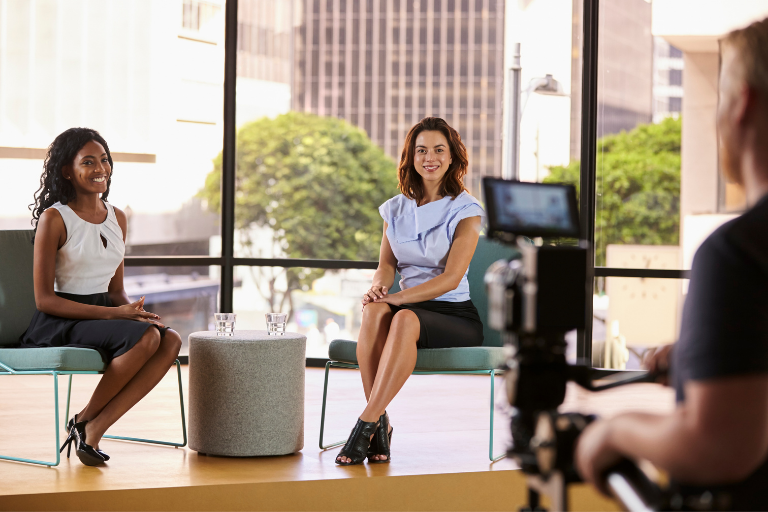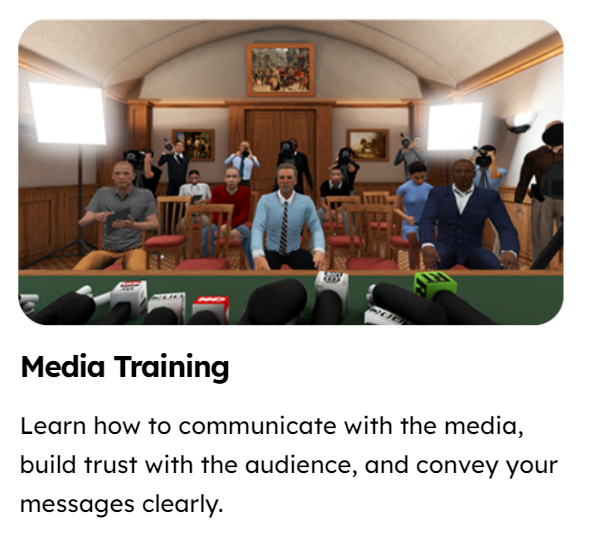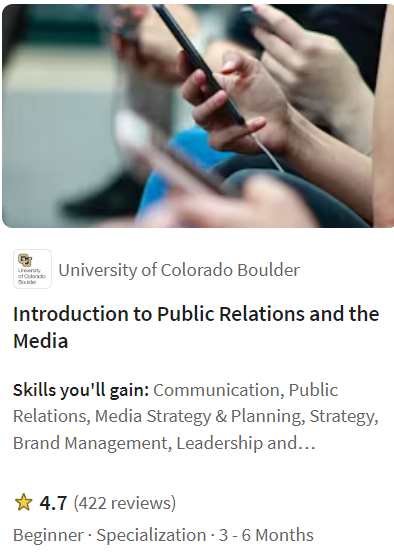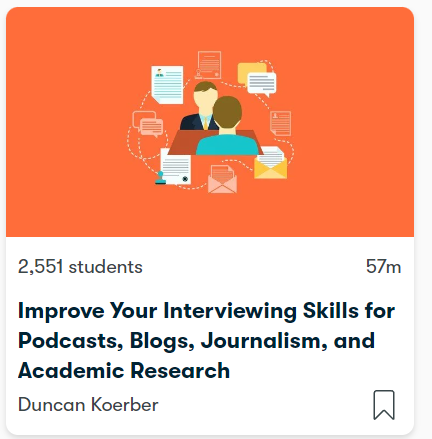- Home
- Courses
- Business Courses
- Media Training Courses
5 Best Media Training Courses to Prepare You for a Media Interview
Preparing for an upcoming media interview? Here are the best online media training courses to equip you with the tools you need to succeed.

Being the spokesperson for an organization comes with a lot of responsibility.
On one hand, you’re provided an opportunity to create a positive impact, by conveying your message with warmth and enthusiasm, and actively enhancing your company’s reputation.
On the other hand, you’re commissioned with the challenge of picking your words carefully, to make sure there’s no room for confusion or misconstrued statements.
Here are the best media training courses online to help you rise up to the task.
These courses go beyond regular public speaking courses, by preparing you to interact with reporters, journalists, and other members of the media during interviews and press conferences.
No matter your current comfort level with external communications, these media relations training courses will boost your confidence and skills.
This post may contain affiliate links. Please read my disclosure for more information.
What are the Best Media Training Courses?
Here are the best media training courses to enroll in online this year:
1. Media Training by Virtual Speech

Every time you talk to a journalist, you have an opportunity to protect and enhance your reputation.
The right training and preparation can help you make the most of that opportunity.
In this media training course by Virtual Speech you'll practice different situations in online exercises or immersive virtual reality (if you have a VR headset), where you'll be able to test out new approaches and learn to communicate with poise, clarity, and conviction.
The course covers the following topics:
- How to adapt your message depending on the type of interview
- Defending an organization or political position on camera
- Putting yourself forward as a media spokesperson for your organization
- Presentation and debating skills necessary for a challenging interview
- Literary techniques you can use to explain your message
- How to deliver messages that are memorable and tell a story
- How to prepare for all eventualities, from breakfast TV to live questioning in a crisis
- Nonverbal techniques, including eye contact and body language
One of the best features about this media training course is that it combines online learning with practice for a unique learning approach.
You'll build your skills and confidence by putting them to the test with computer-generated audiences and AI-generated questions.
Then you'll receive instant feedback on your performance to help identify your strengths and weaknesses.
Here are the practice scenarios included in the course:
- BBC styled studio interview - Practice answering interview questions in a BBC-styled studio. Be more prepared for an upcoming TV interview and learn what to say when under pressure.
- Press conference training - Read your uploaded pre-prepared statement at a press conference event, before answering questions from journalists.
- Down-the-line interview - Practice reading a transcript at different speeds, with just a camera in the room with you. Focus on your tone and body language when speaking to camera.
- Radio or podcast interview - In this scenario, you'll be interviewed for a radio show or podcast and understand how what you say and behave differs from being in front of a camera.
- Guided tour - A narrated audio tour explores the different media situations you may encounter and how to deal with them.
- Media ambush - Experience being ambushed by the media in a hotel lobby and practice answering hostile questions.
Key course features:
- 6 practice exercises
- All practice features
- Flexible, self-led format
- Quizzes and assessment
- Earn a digital course certificate
- Access to updated content
=> Enroll in the Virtual Speech Media Training Course here.
2. Introduction to Public Relations and the Media Specialization

This specialization course by the University of Colorado Boulder is designed for beginners to public relations and branding communication.
You will learn about different forms of media, how to work with journalists, and how to use various tools to manage your company's reputation.
By the end of the course, you will be able to:
- Understand what public relations is and the value it brings to your brand or organization.
- Apply tenets of public relations theory to your business or organization or to your own personal brand.
- Produce professional public relations materials such as press releases, social media content, and influencer lists for your professional portfolio.
- Manage your brand’s reputation and prepare a proactive crisis communication plan for your business or organization.
The specialization includes the following three courses:
- Course 1: Principles of Public Relations
- Course 2: Working with the Media
- Course 3: The Nuts and Bolts of Public Relations
If you're specifically interested in media training, then you'll likely benefit the most from the second course in the specialization.
There you'll learn the basics of crisis communication and reputation management and you'll discover how to leverage storytelling with different outlets and gatekeepers.
Key course features:
Shareable Certificate
- Earn a Certificate upon completion.
100% online courses
- Start instantly and learn at your own schedule.
Flexible Schedule
- Set and maintain flexible deadlines.
Beginner Level
- No previous background knowledge is required; however, you should be interested in media and be an avid news consumer as a student of public relations.
Approximately 1 months to complete
- Suggested pace of 10 hours/week.
=> Enroll in the Introduction to Public Relations and the Media Specialization here.
3. Media Training: Media Interview Skills

This highly-rated media training course is designed to help you prepare for, and deliver, the best possible media appearance.
Learning to appear in media or speak to a journalist may seem intimidating but it isn’t a skill reserved for the few.
Anyone can come across with conviction, gravitas and personality. This course will show you how to effectively speak to journalists - and get quoted.
What you will learn:
- What effective and engaging communication with the media should look and sound like.
- Practical techniques to increase your confidence and authority.
- How to make your messages resonate with the journalist and the audience.
- How to come across as memorable and interesting.
- A practical methodology for preparing and structuring your content.
- How to identify your strengths and weaknesses, for greater self-awareness.
- Understanding nerves and how to tackle them.
- How to get quoted, for the right reasons.
This course is especially for:
- People who are going on podcasts, radio, TV or will be interviewed on stage.
- People who have had experiences they'd rather forget with the media, or where the experience wasn't as good as they'd hoped it would be.
- People who have never appeared in the media before.
By the end of this course, you'll know how to ensure your audience has a positive view of you, remembers your points and trusts your messages.
Key course features:
- 1.5 hours on-demand video
- 1 downloadable resource
- Access on mobile and TV
- Full lifetime access
- Certificate of completion
=> Enroll in the Media Training: Media Interview Skills course here.
4. Improve Your Interviewing Skills for Podcasts, Blogs, Journalism, and Academic Research

Maybe you're not the one being interviewed...maybe you're the one doing the interviewing.
Are you a podcaster, blogger, journalist, or academic researcher looking to improve your interviewing skills but don't know where to start?
The interview is a staple of podcasting and journalism today, but it's often badly done. Most interviewers are making key mistakes that are limiting the potential of their interviews.
In this popular Skillshare course, you'll learn to illuminate a new topic, tell someone's amazing story, and stand out from the millions of interview recordings on the Internet – without ever having to go to journalism school.
The class is taught by an experienced journalist and writing professor and it moves logically through the interview process, including these important topics:
- Preparation to make sure you are respected as a interviewer
- Which recording methods to use, as the technological medium can affect you and your interviewee
- How to reduce the inevitable nerves that come with doing interviews
- The importance of using open-ended questions to get people to open up and tell you fascinating stories
- How to write up your interviews into blog posts and newspaper or magazine articles that are coherent and interesting to read
This class is 57 minutes long and contains 15 lessons.
=> Enroll in the Improve Your Interviewing Skills class on Skillshare.
5. Media Training: Have More Confidence on Camera

Do you have to be on camera for an interview, and need quick media training?
This Udemy course will teach you how to speak more clearly and improve your on-camera presence so that you can command greater confidence and authority in your role.
The course instructor is Christian Hartnett, a multimedia journalist who was recently the youngest field reporter for CBS San Francisco.
Although he struggled at the beginning of his career, he has since learned many tips and tricks over the years that have helped him be successful.
In this course, he will show you how to:
- Implement a daily routine that will help you speak better
- Learn the basics of on-camera preparation
- Be more passionate and ready for your topics with research, outlining, and scripting
- Practice speaking on camera and receive helpful feedback
- Use your body (voice, breathing, face, eyes, mouth, hands, arms, legs) to be more comfortable on camera
- Learn specific techniques to be better for TV appearances, YouTube vlogs, and online courses
In this course, you'll take action and participate in practice exercises. Some of these include submitting practice videos where you'll receive honest, critical, and helpful feedback.
Key course features:
- 2 hours on-demand video
- 4 articles
- Full lifetime access
- Access on mobile and TV
- Certificate of completion
=> Enroll in "Media Training: Have More Confidence on Camera" here.
Final Thoughts
Ultimately, the purpose of media training is to help you represent your company in a dignified, appealing, and attractive manner.
The above media training courses will remind you that you're always in control and able to steer the course of the conversation, even when you're thrown off guard.
When you truly understand this concept and repeatedly see it in action, media interviews won't seem as intimidating after all...
Happy learning!
Thanks for reading! If you liked this content, share with a friend:
Recent Articles
-
5 Subtle Habits That Quietly Transform Your Life Over Time
Jan 25, 26 08:21 PM
Progress towards the things that matter isn't usually loud or dramatic. Here are 5 subtle habits that quietly transform your life over time. -
Inner Work with Marcus Lynn | How to Make Change More Realistic
Jan 19, 26 06:24 PM
In this spotlight interview, therapist Marcus Lynn explains how we can begin to see emotions as information and make change more realistic in our lives. -
7 Best Personal Development Courses to Grow Your Skills and Mindset
Jan 01, 26 11:04 PM
To reach your goals for the year, there are are certain skills you might need to unlock first. Here are the best personal development courses to level up your life in 2026.


















